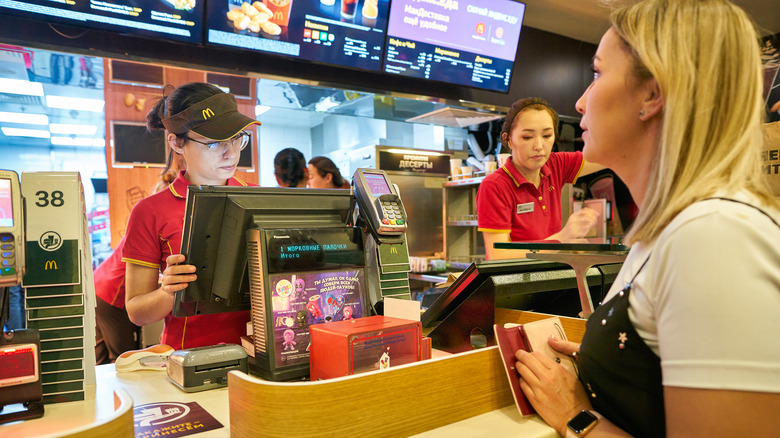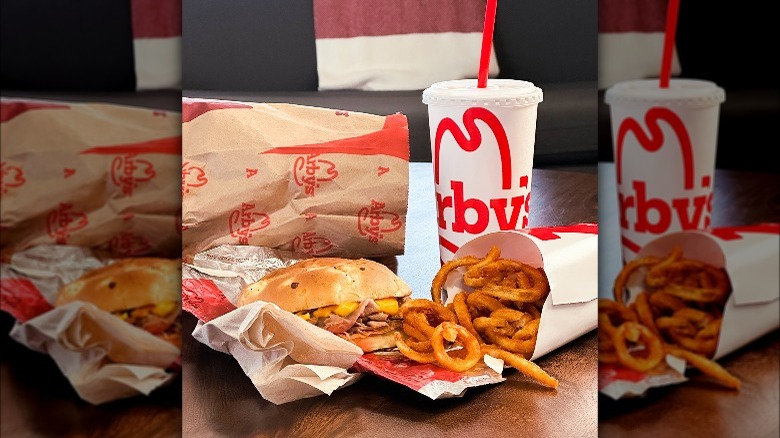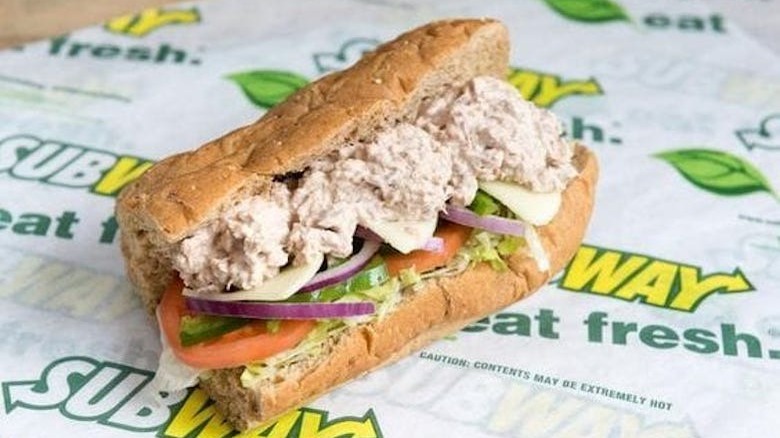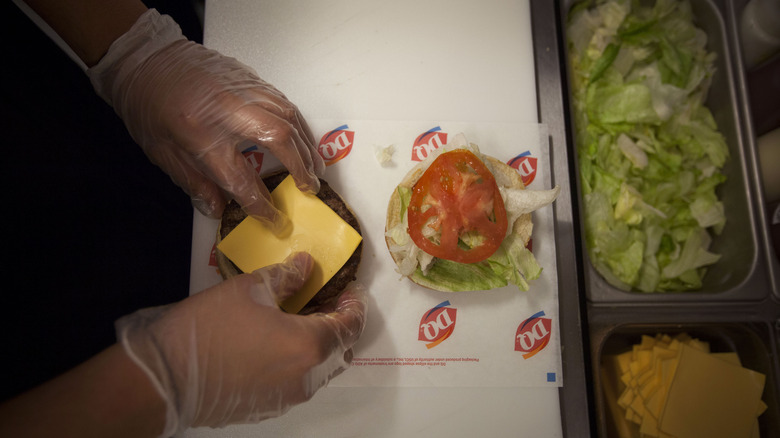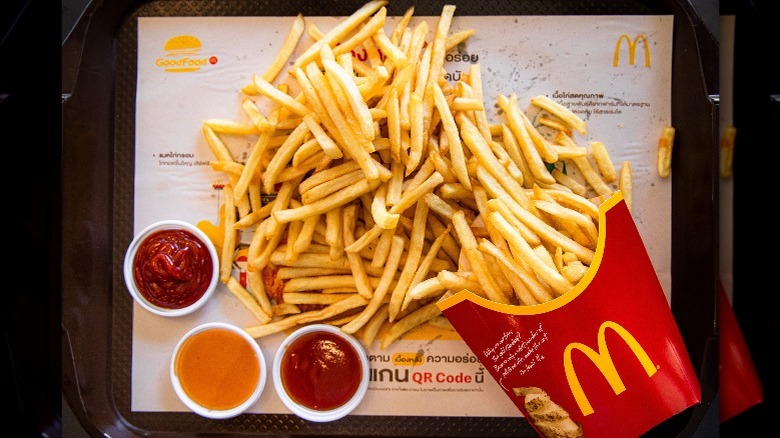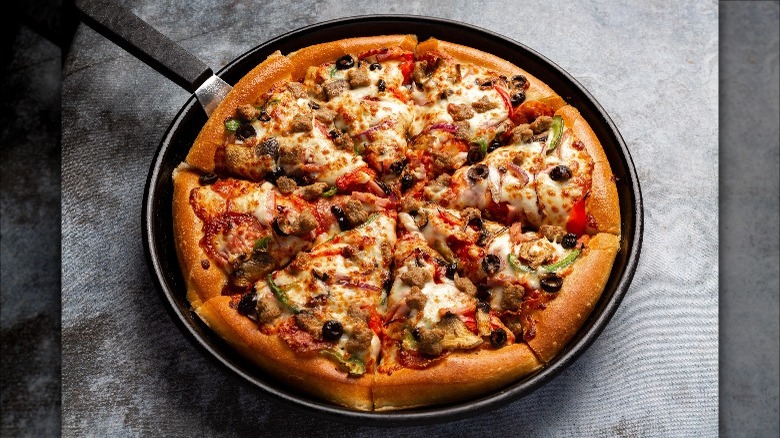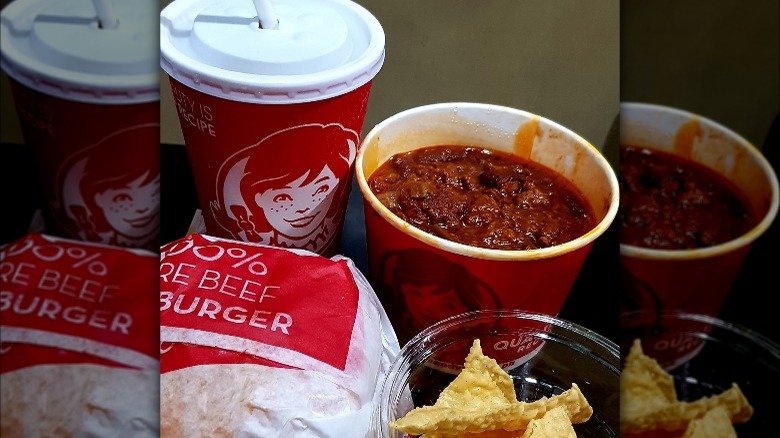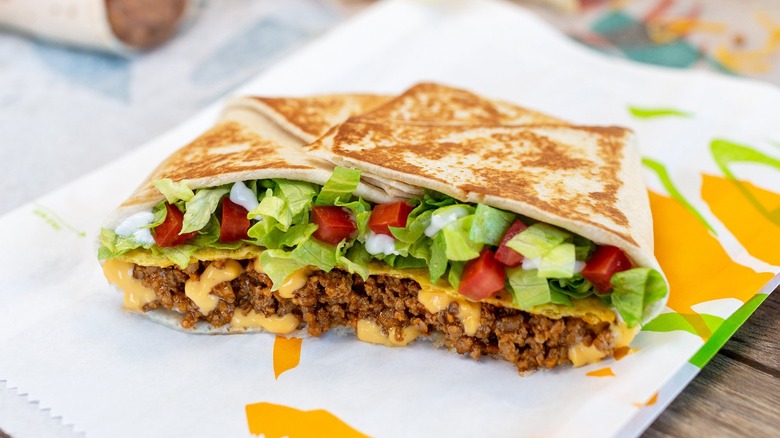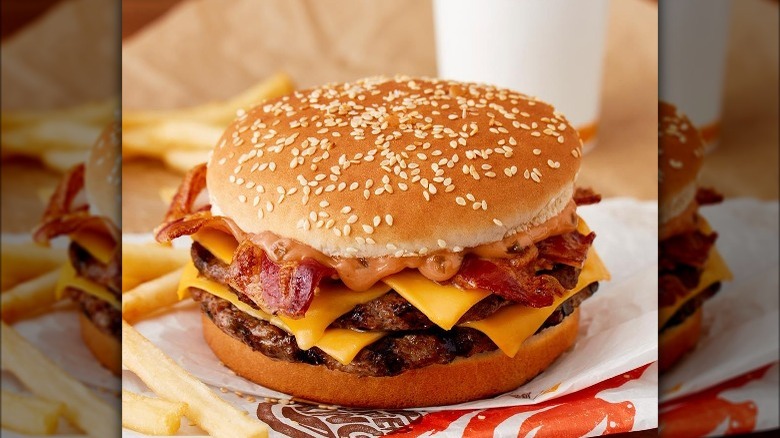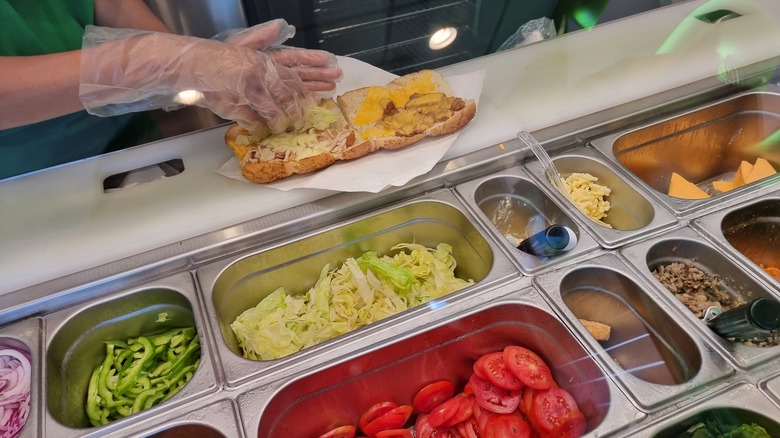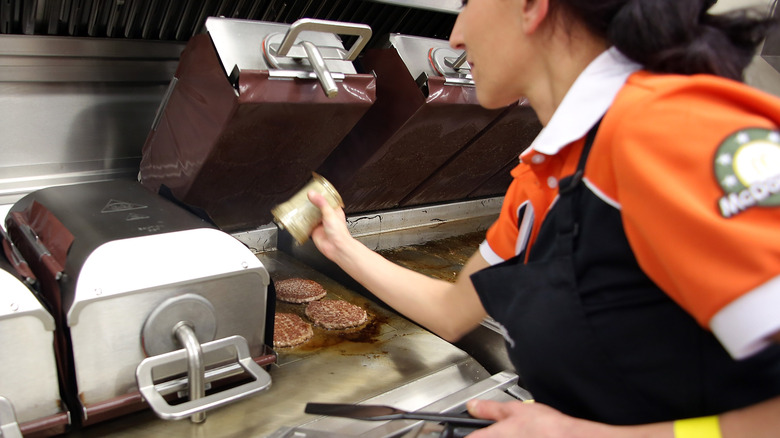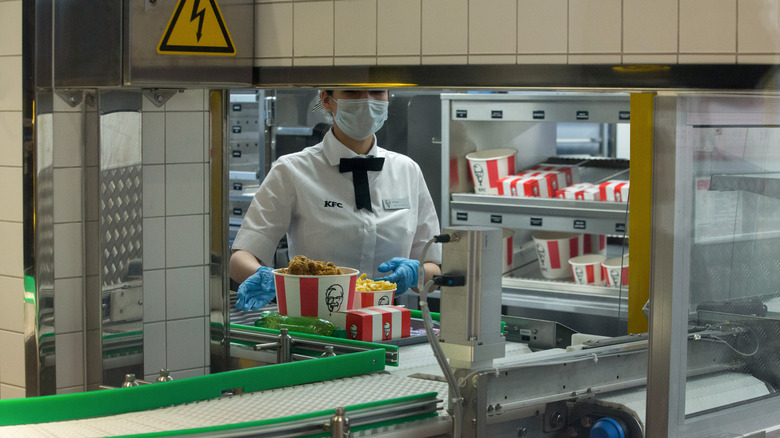Fast Food Restaurants That Were Accused Of Selling Mystery Meat
As much as America loves fast food, there has been no shortage of controversies surrounding these restaurants over the past century. From severed fingers in chili to fried rats showing up in buckets of fried chicken and scalding hot coffee, disturbing events seem to unravel at fast-food chains like clockwork.
It's no secret many chains have been known to cut corners when it comes to the quality of their ingredients. Whether it's fair or not, this has led to several conspiracies, hoaxes, and downright lies about what goes on behind the scenes in the kitchens of our favorite fast-food spots. Although a lot of these stories ended up being nothing more than myths and pranks, several accusations turned out to be totally true.
But chances are you've forgotten a lot of the fast-food controversies that have occurred over the years — like restaurants being accused of selling mystery meat to their customers. Luckily (or unluckily) for you, we've compiled a list of the accusations as well as the truths behind them so you can be informed. Keep reading to take a walk through fast-food meat history ... and don't blame us if it ruins your dining experience.
Arby's Roast Beef
A deep voice exclaiming "We have the meats" might be one of the first things you think of when Arby's comes up — but what exactly are those meats? This was the question that surrounded the restaurant back in 1997, after a rumor started circulating that the company's signature roast beef wasn't really roast beef at all, but rather a combination of gels, liquids, and pastes to form an imitation meat.
Thankfully, Arby's clearly announced there was absolutely no truth to the urban legend and that its beef was entirely made out of beef. Jim Lowder, the brand's quality assurance representative, told Snopes, "Thank you for doing your part to curb the urban legend about Arby's Roast Beef. I'm sure I'm not the first to express frustration about this type of story. The answer to your question is no. Our product does not arrive as a paste, gel, or liquid."
So where did this nasty rumor originate? Most likely it comes from the odd way the sandwich meat is shipped to stores. The roast beef is kept in airtight bags surrounded by a gelatinous broth, with the meat displaying an unappetizing grayish hue. Arby's described the liquid as a "self-basting solution" that keeps the meat juicy during the 3-hour cooking process. Even ex-employees of the restaurant have said the meat looks entirely questionable out of the box, but hey, at least it's real meat.
Subway's Tuna
Subway has been through its share of controversial events over the years — does anyone remember the "yoga mat chemical" in its bread? But one of the nastiest stories might be regarding one specific ingredient: tuna. Several lawsuits accused the sandwich franchise of using tuna that was far from being actual tuna. According to NPR, a marine biologist analyzed 20 samples from 20 different Subway franchises and found "no detectable tuna DNA sequences whatsoever" in 19 of them. Here's the kicker — other types of animal DNA, like chicken and pork, were found instead.
Despite the bombshell accusation, Subway fired back and asserted its tuna was the real deal. In an email to The New York Times, a spokesperson wrote, "Subway delivers 100 percent cooked tuna to its restaurants, which is mixed with mayonnaise and used in freshly made sandwiches, wraps, and salads that are served to and enjoyed by our guests."
In response to the allegations, Subway even put together a dedicated website page debunking the myths about its tuna. For starters, the company states that it always uses FDA-approved wild-caught skipjack tuna. The website addresses several points of the argument, like why it's sometimes normal not to find tuna DNA in cooked tuna, the food quality measures its ingredients uphold, as well as expert opinions on the matter.
The lawsuit has been ongoing for years. Whether the tuna is real or not, it probably isn't doing any favors for the company's PR team.
Dairy Queen's Human Flesh Burgers
Human flesh burgers. That headline surrounded Dairy Queen back in 2019, thanks to a (false) accusation made at a South Carolina branch of the popular franchise. Federal agents raided the restaurant after a man accused the fast-food joint of serving human meat in the burgers, according to Index-Journal.
Although Dairy Queen was quick to announce on Twitter that it was "very proud of [its] 100% beef hamburgers [...] with no additives or fillers," the story, of course, set off a chain reaction of rumors over the internet. However, the accusations were put to rest when Greenwood County Coroner Sonny Cox and other state health inspectors looked further into the case.
Cox told Index-Journal, "I promise you, I've never had anything of that nature asked of me. I've never suspected anything like that. I can honestly say that it's the first I've heard of it, and I don't see any validity in that at all," regarding the presence of human flesh in Dairy Queen's meat. "There's little to no chance of anything like that ever being able to happen." We want to know how the accusing man knew what human meat tasted like.
McDonald's Misleading Natural Flavors
Back in the day, McDonald's was quite open about cooking its french fries in 93% beef fat tallow. The aim was to cut costs, but the result was delicious fries that became famous around the world. Just about everyone loved them (including famous foodies like Julia Child and James Beard) until a prominent businessman named Phil Sokolof had a heart attack, which led to the founding of the National Heart Savers Association. This led to a decades-long fight against McDonald's fries until the company finally relented and swapped beef tallow for 100% vegetable oil.
With the change, many vegetarians and vegans thought they would now be able to enjoy the famous fries — but they were wrong. To mimic the world-famous taste the beef tallow gave the fries, McDonald's used natural beef flavors. The problem? McDonald's didn't publicly announce this ingredient change. This brought on a wave of outrage, especially from vegetarians, vegans, and people from religious backgrounds that don't allow the consumption of beef tallow.
In 2001, two Hindu vegetarians from Seattle sued McDonald's for deceiving its customers with its fries. The fast-food giant fired back and said it never claimed its fries were vegetarian. In the end, McDonald's settled and agreed to donate $10 million to various groups for mislabeling its fries.
Pizza Hut's Expired Meats
In 2014, Pizza Hut went through an international scandal that involved beef and chicken from a Chinese supplier (Shanghai Husi Food Co.), well past expiry dates. Apparently, the products were simply repackaged and given a new expiry date before being sold.
An undercover reporter at the factory found workers using expired chicken skin for chicken nuggets, and even more horrifically, throwing discarded food from the floor into the meat processing machines. Pizza Hut wasn't the only fast-food conglomerate to be affected by the Chinese supplier: McDonald's and KFC were both getting meats from the supplier as well.
Although this may have been an isolated incident, Pizza Hut doesn't have the best track record when it comes to healthy ingredients. In 2009, the franchise made a bold announcement, saying "Pizza Hut is redefining quality in the pizza category," getting rid of things like artificial preservatives, beef fillers, and high fructose corn syrup. But the company quietly backtracked on its healthy promises shortly later. Recently, the Humane League specifically called out pizza chains like Pizza Hut and Domino's for their inhumane treatment of chickens. That's not the best look for the pizza brand.
Wendy's Chili
When you put the words "Wendy's Chili" and "controversy" together, the first thing that likely comes to mind is the infamous "chili finger" case that happened way back in 2005. As the story goes, a woman was eating at a San Jose branch of the restaurant when she "found" part of a human finger in her chili. It was later discovered that her husband got the severed finger from a co-worker. She cooked and planted the finger in the chili, leading the fast-food chain to lose around $21 million in business from the incident.
However, Wendy's "famous" chili doesn't stop the controversy party there. Employees have revealed on online platforms that the bulk of the chili is recycled (and sometimes older) hamburger meat. Redditor u/sweetshiznity said she would never order the chili: "The meat comes from the left over meat on the grill that dries out. It's then cut up, frozen, and bagged for later use in the chili. It's not unhealthy and it won't make you sick or anything, it just doesn't quite sit right with me."
Unfortunately, it's not just gross, it isn't really healthy either. One doctor who spoke to SheFinds says combining already unhealthy patties that have been kept at room temperature for hours is just food poisoning waiting to happen. Is Wendy's being extra sustainable by reducing, reusing, and recycling? Or is it just plain nasty? You be the judge.
Taco Bell's Beef
For many people, the idea of fast-food mystery meat often conjures up images of ground beef from one place in particular: Taco Bell. Back in 2011, the Yum Brands food chain was sued for its seasoned ground beef. According to the attorney representing the lawsuit, "the meat mixture contained just 35 percent beef, with the remaining 65 percent containing water, wheat oats, soy lecithin, maltodextrin, anti-dusting agent, and modified cornstarch" (via Fox News).
Although the lawsuit was eventually withdrawn, Taco Bell became more transparent with its advertising, spending millions to protect its reputation. The franchise released several videos and webpages publicizing that the product was 88% beef and 12% its "signature recipe." Later, it released a spoof of a superhero cartoon to fight back against the beef lawsuit, featuring the "Super Delicious Ingredient Force" vs. Baron von Bland." The company even got a little bit snarky with an ad campaign headline that read, "Thank you for suing us," followed by a full-page ad explaining the contents of its ground beef.
The company CEO, Greg Creed, came out with a statement to reassure customers about the fine quality of the beef product. He went on to say that it was unfortunate the attorneys had not reached out prior to initiating the public lawsuit that painted the company in such a bad light. Taco Bell's beef is indeed beef. Well, 88% beef, at least.
Burger King's Horsemeat
In 2013, a very mysterious meat made its way into Burger King burgers, and not the kind customers wanted — horse meat. For weeks, the burger giant completely denied any allegations that horse meat was being served in its burgers, assuring consumers that its meat hadn't been affected by the European-wide horse meat scandal at the time. But after new tests showed its burgers did indeed contain trace amounts of horse meat, Burger King was forced to admit to the controversy.
It turned out the meat could be traced back to an Irish-based meat processing company called Silvercrest, which in turn imported off-cuts of meat (including horse) from Poland. Burger King wasn't the only company involved in "horsegate" — Tesco, Aldi, and other brands also sold contaminated meat from the supplier. Although food safety experts say that eating horsemeat doesn't have any health risks, people became concerned at the fast-food company's ability to trace ingredients used in its kitchens (via Reuters).
Burger King's vice president, Diego Beamonte, passed the blame back to the supplier and promised consumers that this issue would never occur again. The company promptly replaced all Silvercrest products with a different supplier. Despite the admission, people weren't happy. Several organizations condemned the chain's terrible handling of the situation and lack of transparency. It's hard to blame them for it — especially if they had unknowingly eaten a horse burger.
Subway's Chicken
If you've ever turned down fast-food restaurants for a healthier option like Subway, you might not have gotten all of the natural ingredients you thought you were getting. According to a disturbing study by the Canadian Broadcasting Corporation (CBC), the sandwich shop was serving poultry meat that only contained 50% chicken DNA, when it should contain ... well ... 100% chicken.
When you get a piece of chicken from the store, it should be 100% chicken. However, once seasoned and cooked, that percentage can slightly decrease. In the study, the lab tested samples from several fast-food chains, including A&W, McDonald's, Tim Hortons, and Wendy's — all of which tested in the high 80s for the chicken content. Subway, on the other hand, only landed 53.6% for its oven-roasted chicken and a meager 42.8% for its chicken strips. The rest of the chicken was mostly soy.
Subway, of course, fired back at the CBC. "The accusations made by CBC Marketplace about the content of our chicken are absolutely false and misleading," a spokesperson told NPR. "Our chicken is 100% white meat with seasonings, marinated and delivered to our stores as a finished, cooked product. We have advised them of our strong objections. We do not know how they produced such unreliable and factually incorrect data, but we are insisting on a full retraction." Neither side has backed down from the chicken argument since then.
McDonald's Pink Slime Meat
When people head to their favorite fast-food restaurants for a quick, convenient, and delicious burger, chances are they aren't really putting much thought into where the meat came from, how it's stored, or how it's prepared. Celebrity chef Jamie Oliver decided McDonald's customers needed to know anyway.
On his show "Jamie Oliver's Food Revolution," the chef revealed that a pink slime used as filler in the burger meat was made with fatty beef offcuts covered in ammonium hydroxide. Pink slime wasn't actually a novel occurrence in the industry. It was originally coined in 2002 by a microbiologist at the U.S. Department of Agriculture to label lean, finely-textured beef used in the meat processing industry. However, Oliver publically denounced its use on his show and presented its unappetizing raw state on the air. "Basically, we're taking a product that would be sold at the cheapest form for dogs and after this process, we can give it to humans," he said on his show (via Daily Mail).
After months of campaigning, McDonald's announced it would stop using the beef filler in its burgers. It was a win for burger lovers everywhere — nobody wants pink slime mixed in with their food.
KFC's Mutant Chickens
Many people agree KFC's fried chicken is absolutely delicious, and most would credit that to the Colonel's secret blend of spices. Others, however, might point to more devious strategies — like, say, genetically modifying chickens in order to create bigger, meatier birds.
In 2014, a rumor began to spread that the company rebranded from Kentucky Fried Chicken to KFC, not because it's easier to say, but because it was legally required to do so due to a bogus story that it was creating mutant chickens with extra limbs. A doctored photo showing genetically-modified chickens with extra wings and legs was even shared on social media thousands of times.
Of course, the theory was debunked by platforms like Snopes, which raised several points shutting down the story. For example, KFC sells the equivalent of 736 million chickens every year — and in no way has the power to supply itself with that many genetically modified chickens.
That wouldn't be the last time KFC was accused of selling questionable meat. In 2015, a customer claimed they were served a deep-fried rat. After lab tests, KFC announced that the "rat" was indeed chicken ... it just happened to be shaped like a rat. Sure, KFC's fried chicken isn't the healthiest food in the world, but at least the chain isn't serving up genetically-modified rats. Right?
